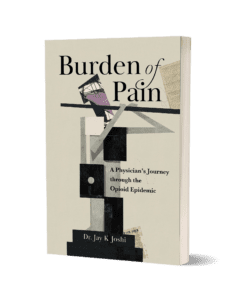My decision to enter a plea bargain never felt like a real decision, but instead a foregone conclusion. Though hardly ever stated explicitly, the understanding was that if I were indicted by a grand jury, then it was presumed I did something wrong. Under that perception, the indictment was not an opportunity to explain and defend myself, but a tragedy to accept and mourn. Any attempt to fight the inevitable was considered merely a stage in the grieving process.
I felt trapped and manipulated, my ability to defend myself weakened as my legal options dwindled to nothing but inaction. I felt defiance and disgust that my identity, as a physician, as a person, could so quickly give way to extremism engulfed and defined me. Soon enough, any attempt to justify or rationalize was met with tacit silence, pressed lips, and expressive eyes balancing sorrow and condemnation. Perception became my harsh new reality, defined by the prosecutor, who selectively created the impressions needed to obtain his desired outcome.
The prosecutor obtained a grand jury indictment by focusing publicly and overtly on the undercover agent’s visits as well as the actions and perjured statements of my medical assistant. To coerce a plea agreement, he impressed upon me directly and covertly the regulatory violations of the collaborative agreements I had used in the patient transitions. He claimed the regulatory policies could be considered criminal, and that he would superimpose additional charges if I were not to plead guilty.
Two separate legal strategies, one public, the other private, one to indict, the other to convict through plea—this was the prosecutor’s desired intent from the outset. The pressure to enter into a plea bargain grew heavier with every article, every motion, every misrepresentation gone unchecked, and every legal interpretation twisted and perpetuated, until I stagnated into a state of helplessness, weighing whatever limited options I had left.
After my indictment, I thought, naively, that I could resolve the matter like I had resolved other issues in my clinic, through open and honest communication. I called the police station, where I had been detained, to schedule a meeting to speak with the Munster police officer leading their opioid awareness initiatives. Surprisingly, he invited me to meet later that day.
We discussed the clinic, the quality model, strategies for patient care, and opportunities for physicians and police officers to work together in managing high-risk patients. We spent a significant amount of time discussing how trust in the clinical setting is essential for high-quality, cost-effective medicine. The meeting went well, and the officer invited me to future community events. I left the meeting, feeling content, decidedly confident that the officer had the right impression of me.
Then my phone rang.
My attorney blasted me for doing something apparently so reckless, so foolhardy, that to the interpretive eyes of the prosecutor must have been an attempt to manipulate the police to my advantage. I quickly realized there were no upcoming events or collaborations; there was only the legal case and its interpretations. From then on, I knew the die had been cast. The stain of criminality had left an indelible impression that could never be removed as long as the legal proceedings went on.
At that point, defiance became delusion, and I was left with no legal recourse and no ability to speak the truth. I stopped fighting. Anger became arrogance, so I stopped getting angry. Sadness gave way to acceptance, and I agreed to accept the plea agreement.
My eyes grew heavy under a lingering shame that overtook my face whenever I looked at my wife and now six-month-old son, feeling the sorrow of unconditional support in every broken smile.
My mind never agreed to what my hand eventually signed. I never believed I’d committed a crime over the course of patient care, and to be honest, I believe I was entrapped. Entrapment consists of two parts: inducement and predisposition. Inducement is when law enforcement directly forces a person to commit a crime, and predisposition is when the government influences a person to behave out of character, thereby committing a crime. How is this anything but an attempt to induce me into a crime? When no crime could be induced, law enforcement imposed intense pressure that led to administrative oversights in the collaborative agreements.
I provided good care to a patient who claimed to have a history of leg pain and behaved as if he were a compliant patient. He was agreeable to lowering his pain medication and to imaging studies once his insurance coverage was activated. This led me to believe he was a patient with legitimate medical issues.
The prosecutor argued that prescribing any opioid medication was illegal, and that by trusting the patient, I violated the law by violating my duty as a physician. He cited the phrase that represents a physician’s civic duty: “Do no harm.” Prosecutors and DEA agents take this phrase and interpret it to mean any prescription they believe is medically unnecessary is immediately illegal, regardless of context. In my case, they used the phrase to imply that I blindly trusted an undercover agent by prescribing medication based on his presenting symptoms rather than requiring verification before prescribing any medication. They turned my trust of a patient into a criminal act.
Blind trust is irresponsible and simply bad medicine. However, so is immediately distrusting and requiring the patient to verify medical conditions before treatment is administered. In finding a balance in trusting and verifying, I performed my duty to someone I had every reason to believe had legitimate medical conditions.
I believe I chose the right balance of verification and trust. I believe I was induced. But what I believe matters less than what they interpreted. And that made all the difference.


















Thank you.